
 Dear HART Supporter,
Dear HART Supporter,
The worst of the cold weather is over, flowers are blooming and crops will soon be planted.
The political situation remains edgy with frequent strikes being called by different interest groups. These can be nationwide or just local but they act as brakes on the development of the country and impair its image abroad.
Please continue reading for an update on latest events...
World Spay Day - Hasanda Neutering Camp
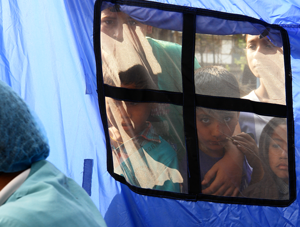 In February, and to celebrate World Spay Day, HART returned to eastern Nepal to conduct a second neutering camp in the town of Hasanda, building on the work of last year.
In February, and to celebrate World Spay Day, HART returned to eastern Nepal to conduct a second neutering camp in the town of Hasanda, building on the work of last year.
There is a huge demand among many of the municipalities throughout the country for sterilisation of their animals. They simply lack the skills and funds to do this work.
As at all our previous camps, as soon as word of our presence reached throughout the community, people and their animals flocked in. Once again, we had to restrict spaying operations on a first come first served basis.
We were delighted to have the assistance of Dr Shael Zelunka (above, right) whose indefatigable energy and sustained effort enabled 185 anti-rabies vaccinations to take place.
Back to top
Schools Programme in Pokhara
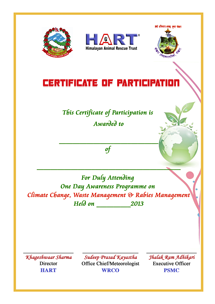
HART, Pokhara Sub Metropolitan City and Western Regional Climate Office have collaborated to conduct a package school educational programme.
This was a first joint school programme which focused on "Climate Change, Solid Waste Management and Dog Population & Rabies Management".
HART staff Chandra Rai and Naryan Dhakal were responsible for the dog element of the programme.
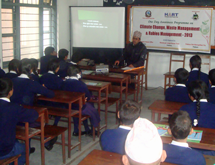 Altogether 12 schools were visited: 315 students and 60 teachers participated.
Altogether 12 schools were visited: 315 students and 60 teachers participated.
It was a very encouraging collaboration as the various elements combine to show children how important and fragile the environment is and how they can take responsibility for maintaining and improving it... for example, by ensuring their animals are sterilised.
Back to top
Cattle sanctuary in Pokhara
As in other Asian towns many cattle wander the streets of Pokhara. Although these cattle are regarded as picturesque local colour by many visitors, in fact, they cause traffic accidents and suffer malnutrition and from various untreated diseases. They cannot be euthanised due to cultural sensitivities.
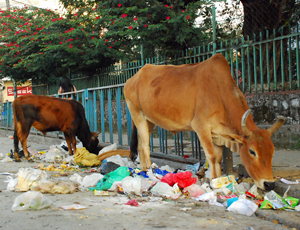
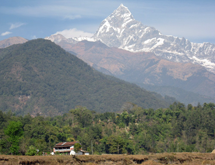
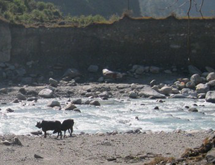
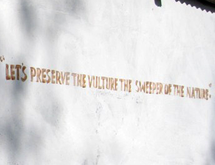
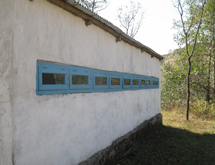 They tend to be bull calves and older females which can no longer produce milk, i.e. animals which cannot justify the costs of feeding.
They tend to be bull calves and older females which can no longer produce milk, i.e. animals which cannot justify the costs of feeding.
The stray cattle are a continuing problem for both HART and the Municipality, as we are both called out to assist sick and injured animals, but neither organisation has appropriate facilities.
A local group has registered an organization called "Vulture Conservation & Cow Shed Centre". They are interested in solving not only the cattle problem, but also in assisting Nepal's vultures by setting up a sanctuary, or Gaushala, to house the cattle from the streets of Pokhara and then, when they die naturally, using their carcasses to feed vultures in the area.
Vultures in Nepal, as in India, have suffered a catastrophic fall in numbers, because they have fed on the corpses of livestock which have been treated with an anti-inflammatory called Diclofenac.
Although Diclofenac is now banned in Nepal and India, some farmers use a human version of the drug to treat their animals.
Therefore the provision of "clean" carcasses will benefit Nepal's damaged vulture population. The group are establishing their sanctuary beside the Seti river in Ghachok VDC, about 10km outside Pokhara.
HART and the PSMC have signed a memorandum of understanding to address the stray cattle problem jointly.
We have liaised with the Vulture and Cow group over the past few months and they are looking for assistance in completing the enclosure of their sanctuary and for the ongoing costs of feeding the animals, transporting and tagging them, and vet care.
The Municipality can offer a small contribution but are looking to HART for partnership funds.
If anyone reading this can offer help, this would be much appreciated.
Back to top
Ongoing Programmes
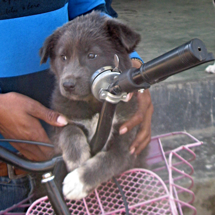 The majority of HART's staff are now in Bharatpur continuing the spaying programme around the city and starting the annual round of anti-rabies vaccinations.
The majority of HART's staff are now in Bharatpur continuing the spaying programme around the city and starting the annual round of anti-rabies vaccinations.
Later in the spring the third census will be carried out in which we hope to determine whether or not the dog population is stable.
Our aim is to maintain a healthy, vaccinated and friendly population of animals who can enjoy free lives within their communities.
Back to top



Very many thanks for your continued support
www.hartnepal.org
If you would like more information about our work, please visit our website or contact our Director, Mr Khageshwaar Sharma, at k.sharma@hartnepal.org